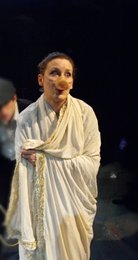The hilarious biting satire on Irish revivalists and romantics, The Poor Mouth, is given full vein in this highly attuned adaptation and performance by Blue Raincoat Theatre company. In his role as adaptor and co-conspirator with the ghost of Brian O'Nolan/Myles na gCopaleen/Flann O'Brien, Jocelyn Clarke has judiciously and deliciously mined the text for the most theatrical and visual episodes of the novel and woven them into a highly stageable narrative. Keenly directed by Niall Henry, this Blue Raincoat production of the final piece in their Flann O’Brien Trilogy (with 2007's The Third Policeman and 2009's At Swim-Two-Birds) is engaging and misses none of the author’s intended targets.
All is based around the life and times of one Bonaparte O'Coonassa, he of the epic name and humble provenance. His family and neighbours in the imagined townland of Corca Dhorcha and all their adventures are fluently related in word, gesture and subtly choreographed ensemble movement. An energetic cast of John Carty, Ciarán Mc Cauley, Nichola Mac Evilly and Jean-Marie Perinetti take on the task of deftly morphing into a medley of characters, animals, chunks of landscape, soundscape and linguistic turns, all at the doff of a cap or a rumble of thunder. Our only recognisable constant companion is Ruth Lehane, who is our principal narrator and autobiographical son, swain and mischief-maker of this particular tribe of ancient gaels.
 One suspects that the author of An Béal Bocht /The Poor Mouth had plenty of mischief-making and some melodrama firmly in mind as many a sacred cow of the ‘Gaelic’ tradition and a few colleen bawns with their cruishkeen lawns tumble down the revered gaelic hillsides. Elsewhere, as the surreal and subversive text comes to life, there is many a swipe at notions of the romantic purity of the west and attendant mythical nonsense, creating a definite post-modern 'Gaels of Laughter’. The stereotypical relentless grey rain, the cold and the damp of “fuar is fliuch”, the ‘custom’ of matchmaking and the educational system all come in for some drenching irony with perfectly formed vignettes acted out by this talented ensemble. The universal naming of children as James O’Donnell and James Son of James would do any Icelandic saga maker proud. It is a headlong rush of ninety minutes and only loses its terrific pace and tension a little in the final third of the show. There is comparatively less visualisation, general uproar and movement at that stage, and the solo storytelling of Lehane has to carry us round several corners to the end of the tale.
One suspects that the author of An Béal Bocht /The Poor Mouth had plenty of mischief-making and some melodrama firmly in mind as many a sacred cow of the ‘Gaelic’ tradition and a few colleen bawns with their cruishkeen lawns tumble down the revered gaelic hillsides. Elsewhere, as the surreal and subversive text comes to life, there is many a swipe at notions of the romantic purity of the west and attendant mythical nonsense, creating a definite post-modern 'Gaels of Laughter’. The stereotypical relentless grey rain, the cold and the damp of “fuar is fliuch”, the ‘custom’ of matchmaking and the educational system all come in for some drenching irony with perfectly formed vignettes acted out by this talented ensemble. The universal naming of children as James O’Donnell and James Son of James would do any Icelandic saga maker proud. It is a headlong rush of ninety minutes and only loses its terrific pace and tension a little in the final third of the show. There is comparatively less visualisation, general uproar and movement at that stage, and the solo storytelling of Lehane has to carry us round several corners to the end of the tale.
In the midst of so many characters and happenings, the staging of Jamie Vartan is kept very simple and leaves the rest to our imaginations. However, you cannot miss the floor designed with an off-kilter map of Ireland and Joe Hunt’s soundscape has cloudbursts punctuating incident and tedium by turn.
The anti-pastoral invective ramps up in the episodes of the darkly comic; the scene of a competitive feis, where the contestants all die in the attempt, or the marvellous Swiftian exchange of piglets for children. And there is more: the báinín-suited crowd from Dublin, seeking authenticity in the primitive but oblivious of the poverty, no doubt they're worrying on the correct usage of the dative case. And as for the mentions of the folk collectors with their “listening machines”, the spirit of Peig and the oral history of the Blaskets is alive and well.
It is a tour de force, and the denizens of Corca Dhorcha repeatedly utter the clichéd phrase: “Ní bheidh ár leitheid arís ann” with affected pathos and regret. But it is true; the likes of this production will not be seen again!
Seona Mac Réamoinn